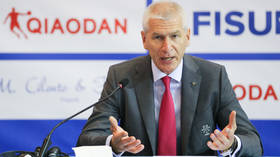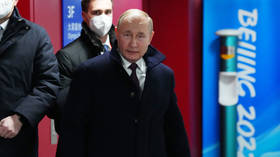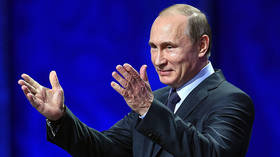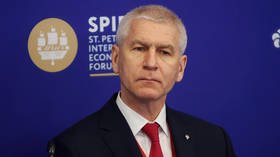Russian sport will weather sanctions storm – minister

Russian sport has the strength to handle the current sanctions imposed by various federations and has already successfully implemented numerous “anti-crisis” measures, according to Sports Minister Oleg Matytsin.
Speaking at a board meeting of his ministry on Monday, Matytsin outlined the pressures that Russian sport has faced since the International Olympic Committee (IOC) recommended a ban in late February on the nation’s athletes as a consequence of the conflict in Ukraine.
“As soon as the sanctions were introduced, we adopted an anti-crisis plan,” Matytsin said, according to TASS.
“The main task is to strengthen the national sports system. We insist that Russia was and remains a powerful, self-sufficient sporting power that can overcome these temporary sanctions.”
Matytsin went on to detail the measures that Russia has taken to help its athletes by arranging alternative events as they are sidelined from global showpieces.
That includes the ‘We are Together. Sport’ tournament held in Siberia in March for the nation’s Paralympians after they were barred from the 2022 Beijing Winter Paralympics.
“We are faced with unprecedented pressure to limit the performances [of Russian athletes] at international competitions and to hold sporting events,” said Matytsin, according to RIA Novosti.
“The president instructed us to ensure the stability of the sports system, we presented a set of measures in 13 main areas.
“The results are not easy, but we see a positive trend in the implementation of the tasks set.
“The main tasks are to ensure the competitive process, and to maintain a plan for a unified calendar [of sporting events].
“The instruction given by the president to implement new competitive models has been fulfilled,” added Matytsin.
“The first signs were the games for the Paralympians ‘We are Together’. We are very pleased that in a short time Sochi will also hold open events for Paralympic athletes.”
The Russian sports minister also noted the ‘Friendship Games’ held in Tatarstan during the summer, which he said welcomed more than 1,000 athletes from 15 countries.
There was also the resurrection of the Soviet-era ‘Spartakiad’ series of competitions across numerous sports.
“[The Spartakiad] should become the most significant benchmark for evaluating all projects – infrastructure and the implementation of programs for the development of sport,” Matytsin said of the event.
“It is very important that our decisions on the payment of bonuses [for Russian athletes] were supported.
“Athletes and coaches will be paid prizes in the amount paid at world championships. It is also important that we do not forget about the Russian national championships.”
While Matytsin noted increased sporting cooperation with partners in the CIS (Commonwealth of Independent States), BRICS (Brazil, Russia, India, China, South Africa) and SCO (Shanghai Cooperation Organization) groups of nations – particularly once China reduces current Covid-19 restrictions – he said Russia was not shutting itself off from the wider world, nor would it seek to set up “alternative” federations to the likes of the IOC.
“The president of the Russian Federation spoke about this… We continue to interact with international organizations,” Matytsin said.
“We don’t need a confrontation with existing structures, there is no need to declare some kind of autonomy.
“This is not the first time we have faced political pressure, we have dealt with such situations in the past.
“We must be guided by the interests of our athletes,” pledged Matytsin, noting that aiming to create parallel international sporting bodies could do more harm than good.
Thus far, the IOC has shown no sign of changing its stance on recommending a ban on Russian and Belarusian athletes from global events.
IOC president Thomas Bach has claimed the decision is partly to protect the athletes themselves from supposed hostility they would face outside their respective countries.
That position has been described as “hypocritical” by the likes of Russian Olympic high jump champion Mariya Lasitskene, while Russian officials have branded the bans discriminatory and undermining the principle of sport being outside politics.
It has also been noted that other countries – not least the US and its NATO allies – have not faced similar sanctions despite launching foreign military campaigns down the years.















